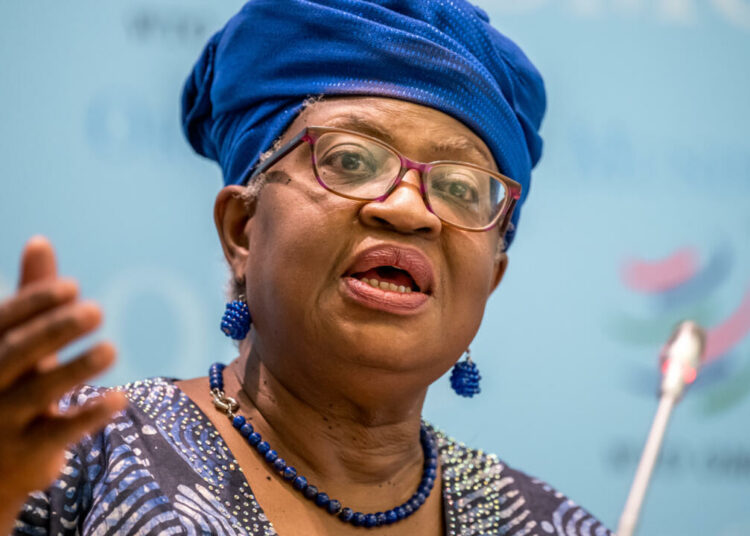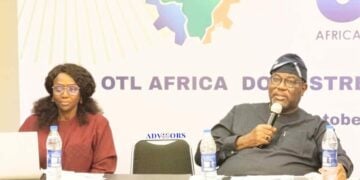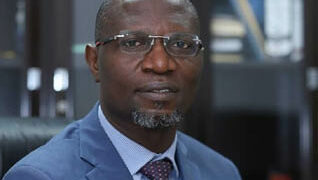Director-general of the World Trade Organisation (WTO), Dr. Ngozi Okonjo-Iweala, has warned that African countries must change from reliance on foreign aid and take bolder steps to attract investment, as global donor support continues to wane.
Speaking on the sidelines of ongoing International Monetary Fund (IMF)/ World Bank 2025 Spring Meetings in Washington DC on the shifting U.S. trade policies, Okonjo-Iweala said the continent must prepare for a new era of self-reliance driven by domestic reform, infrastructure development, and trade diversification.
“It is very clear, aid is disappearing. There may be a little left, but it is disappearing.” Stating that what Africa needs now is investment, she said there is more to be done to mobilize domestic resources, remove bureaucratic bottlenecks, and build investor confidence.
“We need investment. And when you need investment, you have to do so much more in terms of mobilizing domestic resources to put infrastructure in place, removing bureaucratic barriers so investment can come in. And this is what we need to do.”
Noting that Africa is only marginally affected by current U.S. tariff changes, due to its limited trade volume with the US she said the broader challenge is Africa’s shrinking relevance in global trade. The continent accounts for just three per cent of global exports, and intra-African trade remains low at around 16 to 20 per cent.
“We need to trade more. We cannot trade more externally, where our trade is only three per cent of world trade, or internally, where intra Africa trade is 16 to 20 per cent at most. If we don’t add value to our products, we keep exporting the same things, you know, commodities that are not processed. We don’t create jobs, so we must attract investment to change that, and then trade internally.
“Lesotho is exporting $200 billion worth of textiles to the US, and we are all lamenting that this market will be taken away. Guess what? Africa spends $7 billion importing textiles. So why can’t Lesotho sell its textiles in the African market? It is making jeans.
We import jeans, whether it is first hand or second hand. Why can’t Lesotho trade within Africa and sell this is the kind of thinking we need.”
On the impact of the trade tariffs on the continent, she said while many countries in Africa are not severely impacted, some poor countries are feeling the brunt of the harsh tariffs. She pointed to Lesotho as a stark example: the small, landlocked country exports $200 million worth of textiles to the U.S., which are now at risk due to high reciprocal tariffs.
“The impact for the continent as a whole is not that bad. However, it’s both good news and bad news. Good news is that it’s limited. Bad news as well, we’re not trading that much, which is not a good thing. But the problem is that within Africa, there are a handful of countries that are very severely impacted because they have got high reciprocal tariffs put on them, and these are poor countries.
“Lesotho has 50 per cent reciprocal tariffs. It exports $200 million worth of textiles to the US, imports about $3 million worth of goods from the US. So very little. And if you look at that, if those tariffs are implemented on Lesotho, it will lose almost half a percentage point of its GDP growth, which is huge for a poor country, it will lose a lot of its exports to the US, even though it might gain a little bit by exporting elsewhere.
“So we are asking the US to look at least developed countries, the poorest, and to try to waive these reciprocal tariffs, to remove them, so that the poorest countries and Africa as a whole, that we don’t have these tariffs on us.
“Cote d’Ivoire has the same 21 per cent reciprocal tariffs, but Ghana, next door, has 10 per cent. Guess what, Cote d’Ivoire exports almost a billion dollars worth to the US. So, it is going to disappear across the border if you have differential, reciprocal tariffs. So, Africa is not scot free. I’m saying as a whole, the continent is not as impacted but certain countries are definitely hit, and we have to take care of them,” she stated.





